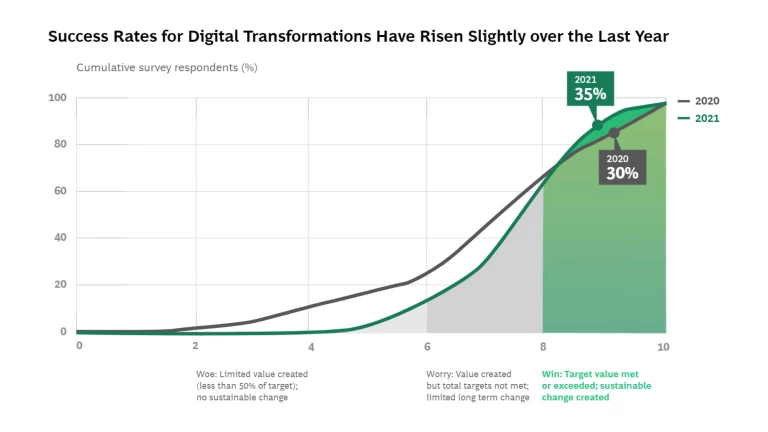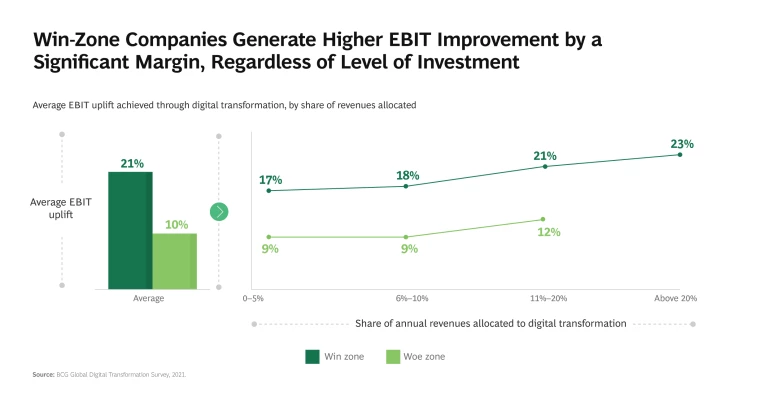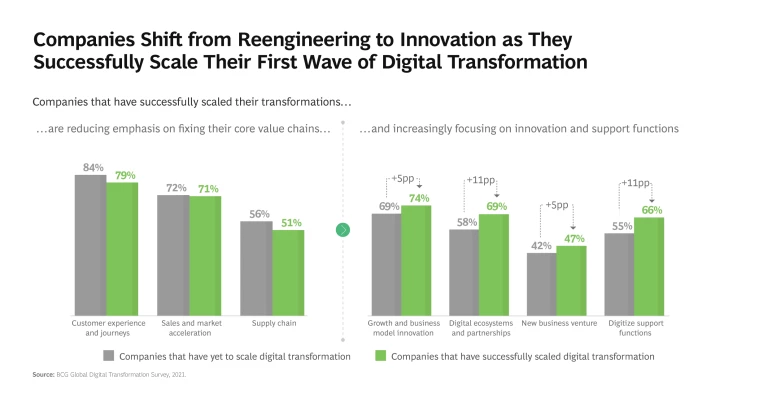Beyond the critical question of how to deliver a successful digital transformation, there are three other questions we hear a lot. How are companies in my sector doing? Is there any proof that transformations deliver real results? And where are leaders focusing their transformation programs? New BCG research provides some answers.
Company Success
Data from our 2021 research, involving more than 850 companies worldwide, shows that only 35% of companies achieve their digital transformation objectives, up slightly from 30% in 2020.
The modest increase may reflect an “experience effect” as knowledge disseminates about the six success factors we described in our 2020 study—factors which, taken together, flip the odds for transformation success from 30% to
Real Results
The bottom line on digital transformations is that they generate clear and significant financial impact. On average, companies that addressed the six success factors reported a 21% EBIT increase in the businesses within the scope of the transformation compared with only a 10% increase on average for those companies that did not. (See the exhibit, “Win-Zone Companies Generate Higher EBIT Improvement by a Significant Margin, Regardless of Level of Investment.”)
The performance uplift was largely independent of the transformation focus, indicating that companies are doing a good job on one of the key components of an integrated strategy: focusing transformation programs on where they can drive most value. And while there appears to be a minimum threshold of investment for a digital transformation to succeed, our research has found that success is not characterized by the amount spent on the transformation but rather by comprehensively addressing the six key success factors.
Companies that have been successful in the first wave of a digital transformation report much greater success in scaling those capabilities to create broader, sustainable change. “Win zone” companies—those where the transformation’s target value was met or exceeded and sustainable change created—on average report a 1.5 times greater achieved success in scaling digital capabilities across the entire organization compared with companies in the “woe zone,” which achieved less than half of their target value and created no sustainable change. This is a huge advantage—as many executives tell us, it’s one thing to deliver a “point-solution success” but quite another to drive the adoption of new technologies and ways of working at scale across divisions and regions.
Leaders’ Focus
For companies that have already scaled an initial wave of transformation initiatives, the emphasis is clearly shifting from digital reengineering to innovation. (See the exhibit, “Companies Shift from Reengineering to Innovation as They Successfully Scale Their First Wave of Digital Transformation.”) These companies used the first wave of digital transformation to address the all-important basics of their core businesses, digitally reengineering customer journeys as well as sales and marketing channels and using digital solutions to improve productivity. Now, companies that have successfully scaled their transformations are shifting their focus to innovation—both in the core and with new ventures. Successful digital transformers are upping the ante, and as they leverage their digital skills to innovate faster and better, the gap will widen between winning digital transformers and their laggard competitors.
Get the Full Story
There’s more to the story, including sector-specific transformation priorities and the rise of ESG considerations as key transformation drivers. Download the full report to delve into the details of digital transformation success today.









